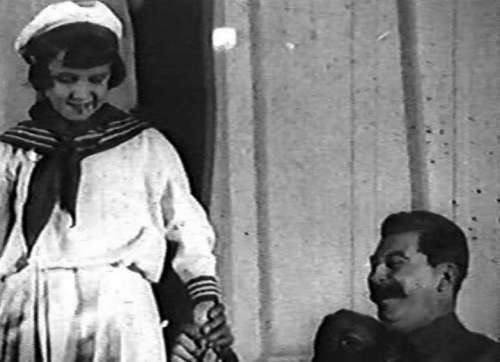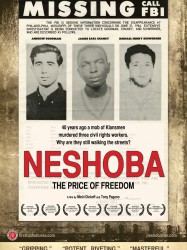Kolybelnaya est un film de genre Documentaire réalisé par Dziga Vertov
Kolybelnaya (1937)

Si vous aimez ce film, faites-le savoir !
Lullaby (Russian: Колыбельная, translit. Kolybelnaya) is a 1937 Soviet documentary film directed by Dziga Vertov. The film was shot to commemorate the 20th anniversary of October Revolution.
Commentaires
Postez un commentaire :
Suggestions de films similaires à Kolybelnaya
Il y a 5 films avec le même réalisateur, 8968 ayant les mêmes genres cinématographiques, 7799 films qui ont les mêmes thèmes (dont 893 films qui ont les mêmes 2 thèmes que Kolybelnaya), pour avoir au final 70 suggestions de films similaires.Si vous avez aimé Kolybelnaya, vous aimerez sûrement les films similaires suivants :

Pamiati Sergo Ordzhonikidze (1938)
Réalisé par Dziga Vertov
Genres Documentaire
Thèmes Documentaire sur la politique, Politique
Note56%






La Sixième Partie du monde (1926)
, 1h13Réalisé par Dziga Vertov
Origine Russie
Genres Documentaire
Thèmes Politique, Politique
Note71%





Ode à la patrie nouvellement élargie : sont rassemblées pour l'occasion les diverses nationalités, mais déclinés aussi les progrès technologiques liés à l'avènement prodigue de la Révolution.

The Order of Myths (2008)
, 1h19Origine Etats-Unis
Genres Documentaire
Thèmes Le racisme, Documentaire sur la discrimination, Documentaire sur le droit, Documentaire historique, Documentaire sur une personnalité, Documentaire sur la politique, Politique
Note68%






Neshoba (2010)
Genres Documentaire
Thèmes Le racisme, Documentaire sur la discrimination, Documentaire sur le droit, Documentaire historique, Documentaire sur une personnalité, Documentaire sur la politique, Politique
Note76%





Neshoba explores the history and changing racial attitudes of Neshoba County, Mississippi four decades after the murders of James Chaney, Andrew Goodman, and Michael Schwerner during Freedom Summer. The film captures the trial of Edgar Ray Killen, who granted the filmmakers "extraordinary access".

I.O.U.S.A. (2008)
, 1h25Réalisé par Patrick Creadon
Origine Etats-Unis
Genres Documentaire
Thèmes Documentaire historique, Documentaire sur la politique, Politique
Note73%





The film follows Bixby and Walker who describe systematically four serious deficits shaping the U.S. economy: budget, savings, the balance of payments, and leadership. As of the early 2008 release of the film they had created a national debt of over $9.6 trillion, $30,000 for each American.
 , 1h39
, 1h39Genres Guerre, Documentaire
Thèmes Documentaire sur le monde des affaires, Documentaire sur le cinéma, Documentaire sur la guerre, Documentaire historique, Documentaire sur une personnalité, Documentaire sur la politique, Politique, Documentaire sur la Seconde Guerre mondiale
Acteurs Veit Harlan, Hilde Körber, Christiane Kubrick, Kristina Söderbaum
Note68%






The Frontier Gandhi (2008)
, 1h28Genres Documentaire
Thèmes Documentaire sur une personnalité, Documentaire sur la politique, Politique
Acteurs Om Puri

Flower in the Gun Barrel (2008)
Origine Etats-Unis
Genres Documentaire
Thèmes Afrique post-coloniale, Le racisme, Documentaire sur la discrimination, Documentaire sur le droit, Documentaire sur la guerre, Documentaire historique, Documentaire sur une personnalité, Documentaire sur la politique, Politique
Note80%





To a large extent, the film consists of interviews with genocide survivors, many of whom were children in 1994. In all, over thirty survivors, perpetrators, and experts were interviewed for the film. In these interviews, the survivors discuss what it means to be a Rwandan and to live next door to people who killed their families. The survivors describe how they deal with their country's request that they forgive one another and move on, so that Rwanda can rebuild and unify itself. Perpetrators' views illuminate the madness that seized the culture in 1994; exploring the experience of apologizing to victims, and examining what it is like to be looked at as a murderer in Rwandan society.

Flow: For Love of Water (2008)
, 1h33Origine Etats-Unis
Genres Documentaire
Thèmes L'environnement, Documentaire sur l'environnement, Documentaire sur la politique, Politique
Note74%






Fitna (2008)
, 17minutesGenres Documentaire
Thèmes Religion, Le terrorisme, Documentaire sur le droit, Documentaire sur la guerre, Documentaire historique, Documentaire sur la politique, Documentaire sur la religion, Documentaire sur le terrorisme, Politique, Religion musulmane
Note47%





The film shows a selection of Suras from the Qur'an, interspersed with newspaper clippings and media clips with The Arabian Dance and Åses død as an underscore.
 Connexion
Connexion